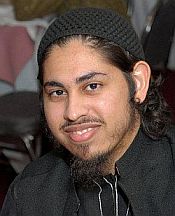An American teenager gets blown up in a US drone strike and the only explanation provided for why he was killed is that his father was alleged to be a terrorist. And given the small amount of reporting on yesterday’s killings it appears that having covered the Obama-kills-an-American story last month, Obama-kills-another-American is a story of no great interest. But this isn’t just a story about the abuse of executive power. It would now appear that individuals can be snuffed out just because the US government objects to what they are saying.
The New York Times reports: Airstrikes, believed to have been carried out by American drones, killed at least nine people in southern Yemen, including a senior official of the regional branch of Al Qaeda and an American, the 17-year-old son of a Qaeda official killed by the United States last month, according to the government and local reports on Saturday.
Fighting also escalated in the capital, Sana, where at least 12 antigovernment protesters were killed by security forces near the Foreign Ministry and at least four civilians were killed in a battle near the airport, opposition officials said.
The fighting in Sana was the deadliest since President Ali Abdullah Saleh returned to the country last month, and coincided with rising political tensions as all sides await a statement by the United Nations Security Council expected in weeks.
Yemen has been in turmoil for months, as protesters demanding the ouster of Mr. Saleh, who has ruled for 33 years, have filled the streets, and rival political factions have fought for power. Despite tremendous domestic opposition, international pressure and an assassination attempt that severely wounded him in June, Mr. Saleh has refused to step down.
Islamic militant groups, including Al Qaeda in the Arabian Peninsula, the Yemeni branch of the terrorist organization, have exploited the chaos, taking over large regions in Shabwa and Abyan Provinces in the south.
The American drone strike last month that killed the Qaeda official, Anwar al-Awlaki, has been particularly controversial in the United States. Despite being an American citizen, Mr. Awlaki, a Qaeda propagandist, was killed without a trial. The United States has argued that he had taken on an operational role in the organization, plotting attacks against Americans, which made him a legitimate target.
The killing of his son in a drone attack on Friday night, if confirmed, would be the third time an American was killed by such a United States attack in Yemen, although it was not clear if the son was an intended target. A second American, Samir Khan, the editor of Al Qaeda’s online magazine, was killed in the attack on Mr. Awlaki, which was launched from a new secret C.I.A. base on the Arabian Peninsula.

 The fact that President Obama decided to target the US citizen Anwar Awlaki for extra-judicial execution, is a subject of considerable
The fact that President Obama decided to target the US citizen Anwar Awlaki for extra-judicial execution, is a subject of considerable